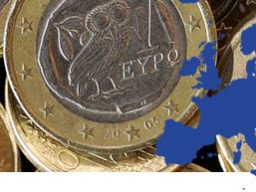In an age when most people have a concentration span of a few minutes, it may seem that the “Greek crisis” is over. The country has received its second bailout (130 billion euros), private bondholders have taken a 75 per cent loss and everything has gone quiet. The European Union, via the ECB and the tough political banging of heads by Angela Merkel and Nicholas Sarkozy, has prevented a firestorm of defaults across the continent, and saved poor Greece from national collapse.

100 drachma banknote. Photo: Tonton Bernardo. Source: Wikimedia
Needless to say, no person paying serious attention to the events of recent months and the actual economic situation of Greece and many other European countries believes this story for a moment. It was first thought it would take until 2020 for Greece’s public debt to reach 120 per cent of GDP, the maximum that the IMF considers sustainable. Now the IMF thinks the debt ratio will be 129 per cent by then! Does anyone think this figure will not increase many more times over the next few years? The Greek economy has been shrinking for several years, and will contract by nearly 5 per cent, if not more, in 2012. How can the country reduce its debt if it does not grow its economy? Where will the revenues come from?
Countries that have control over their own currency, as we know, can literally print their way out of trouble. Not only does inflation eat away at the debt, but the devalued currency makes it much easier for a nation to trade its way out of difficulty by increasing exports. Of course, devaluation also increases the cost of imports. But the 1932 experience shows that Greece has in the past been able to weather acute financial storms. The country suffered far less than many others during the Great Depression, through a combination of devaluation (including going off the gold standard) and protectionism that restricted imports. Believe it or not, but Greece’s average economic growth rate from 1932 to 1939 was 3.5 per cent. In contrast to which, the French economy contracted between 1930 and 1939. In Germany there was more growth than in Greece, but as we know a large part of it (around 20 per cent of growth by 1939) was produced by the totalitarian mobilization of the population and preparation for war.
Needless to say, economists argue endlessly over whether a country can devalue its way out of a debt crisis (without even greater damage further on), and specifically whether Greece would be better off, economically, in or out of the euro. What concerns me, as a philosopher, more than the specifics of the economic case are the broader moral and political considerations that are relevant to the Greek situation and that country’s long-term welfare. No one, not even the Greeks themselves, would claim they haven’t had it too good for a very long time. How can it be healthy for a country of 11 million people to have over one million of them working for the government (with 40 per cent of GDP coming from the public sector)? All of these government workers have historically been on very generous pensions, with extra monthly pay packets on top of the regular 12, bonuses at Christmas, bonuses for turning up on time, for delivering envelopes, for washing their hands…
None of this is a secret, though it cannot fail to amaze people who learn about it. So what follows from it? That Greece is a country of lazy leeches who bleed the taxpayer, assuming there is anyone left who actually pays tax? That somehow the Greek people have brought this disaster on themselves because of some inherent disorder in the national character, making them lazy, feckless and just plain stupid? These are not views generally aired explicitly in the UK and American media, but it is hard for me not to discern a quiet arrogance on the part of many commentators (Mark Steyn among them, though he now realizes that the American situation is hardly much better, and probably a lot worse) who seem to think that Greece is no surprise, nor is Portugal or Spain: just typical, corrupt “southern European” or “Mediterranean” countries where you would expect a fiscal crisis to begin on the continent. They should never have joined the euro, they have upset the whole grand, noble experiment in currency union, they are fundamentally useless, corrupt countries who need to be told how to run their economies. There can be little doubt that this is how Merkel and Sarkozy, and their advisers, feel about the situation. Those damned Greeks: if only we hadn’t let them in. If only, once in, they had taken a compulsory course on Franco-German fiscal rectitude!
The purely economic response to this crass and truly stupid attitude is to point out that very few countries have healthy economies at the moment. German public debt amounts to 80 per cent of GDP, as does French and British; America’s is over 100 per cent. As Carmen Reinhart and Kenneth Rogoff famously argued in their book This Time It’s Different, once public debt reaches 90 per cent of GDP, economic growth consistently declines in a strongly correlated way. Let’s not forget: the global economic crisis did not begin in Greece! It began in the USA, with the sub-prime housing disaster and all the other familiar collapses, bankruptcies and bailouts that were either caused by or accompanied the bursting of the housing bubble. Greek debt is in the few hundreds of billions of euros – admittedly a ridiculously high number for such a small country, but utterly dwarfed by the USA’s many, many trillions of dollars of debt, the default on which (something not a few economists regard as inevitable) would destroy the entire global financial system. The private bondholders who have lost massively on Greek debt will not collapse a single province of a single country in the eurozone. Sure, more banks will go bankrupt or “have” to be bailed out by European taxpayers far more foolish than the Greek public sector workers who enjoyed their bonuses and their triple pay while they could. But Greece’s plight is not going to collapse anything, not even Greece because it is the French and Germans who are collapsing that country.
Which brings me to the ethical dimension of this whole sorry story. It is not about economics pure and simple but about the ways in which money is used and abused and, more importantly, about corruption, the whole European situation and the relations between member states of the EU. Greece joined the EU mainly for the political stability it was hoped this would bring, as well as the defence benefits (vis-á-vis Turkey) of belonging to a major political bloc. One can understand these reasons. But why is there an EU in the first place? To achieve political stability in a continent with a long history of war. So let’s count. In the last two hundred years, Germany has started two rather large wars in Europe. So has France. Greece has started, as far as I can tell, none. No surprise, then, that the French and Germans wanted the EU as a way of preventing themselves from killing each other. Most of the minor EU members have gone along for the ride; who wouldn’t? Greece has benefitted from structural funds coming straight from France, Germany, and the other wealthier countries. Joining the euro in 2000 gave Greece access to borrowing at lower interest rates than under the drachma, so again no surprise that the country went on a spending spree. So here’s what Greece can be accused of on this score: joining a club started by other countries for their own reasons and enjoying the incidental benefits that came from such membership.
This does not seem to me to be the greatest political sin in history. Greece did not start the EU; nor did she invent the euro. Her last empire ended in 1453. Since then she has been conquered and occupied by Muslims, deprived of independence, invaded by other European countries, and generally held back from concentrating on investment and growth. This led to mass emigration to Australia, America and other countries. Indeed, it is hard not to compare the Greek situation to Ireland, another small nation that until recent decades has never been given a chance to enjoy independence, develop its economy, and encourage the return of its citizens from the many countries in which they settled. Both nations saw obvious benefits to come from joining first the “exclusive” EU club and then the even more “select” eurozone. Both rapidly began to enjoy good times, both benefitted from EU funds redistributed from larger and wealthier countries. Both gave up the right to print their own money, control their own interest rates, and manage their own budgets without external interference. Once the US-created financial crisis made waves across Europe, both Greece and Ireland were shaken: the party was over but they were given no choice of hangover remedy. (Well, Ireland has had more flexibility in terms of taxation, but its austerity programme has been nearly as brutal as Greece’s.)
So, when you abstract from the economic detail and look at the big picture, you find what you have always found – the smaller European countries at the mercy of the larger ones, caught in the crossfire of Franco-German diktat and a crisis not of their own making. The big countries make the rules, and the rest have to follow. What’s new? Why has Greece been picked on, ridiculed, analysed to death, and then used as some sort of “example” to scare Portugal, Spain, Italy and maybe a few other countries with fiscal secrets to hide? Why has Greece been invaded yet again, now involving long-term German oversight of the Greek budget? I’m not aware that anyone forced German, French, British and other banks to lend money to Greece. I don’t recall reading about private investors being lined up at gunpoint if they refused to hand the Greek government money. I haven’t read anything about Greece threatening war if the EU didn’t give or lend to them. I assume these are adults we are talking about, who entered into loan agreements after doing some sort of due diligence on their debtor. They knew, I assume, that Greece has defaulted on its debt at least five times in the last 200 years. But these reckless lenders are now doing what any reckless lender would do who wanted at least some of their money back – ganging up to punish their debtor. It might be expected, it might even be rational; but that does not make it any more admirable than the downmarket loan company that sends a tough guy to threaten poor families to pay off their loans.
Greece’s solution is simple: leave the eurozone, then leave the EU, return to the drachma – let’s call it the New Drachma – and start devaluing the debt. The solution might be simple, but the pain will be sharp: inflation, economic chaos until the country readjusts to the new situation, the apparent humiliation of leaving the “club”, the extreme difficulty of taking out new loans. But this will all come to an end much faster than dying an agonizing death of endless austerity as far as the eye can see, with the grinding and demoralizing effect this has on a nation’s long-term psyche, not to mention all the hardship – of a kind Greeks never thought they would live to see – it is causing right now. Who will lend if Greece returns to the drachma? She would have to go to her traditional allies, especially Russia, cap in hand to be sure, with high interest rates the only option; but of course she would be lent to.
Exiting the EU and eurozone, though, will not of itself solve Greece’s long-term problems. They have as their source one thing and one thing only: Greece’s corrupt and unworthy political class. For decades they have bribed voters with promises of public sector largesse, giving the people the impression they could live beyond their means indefinitely. What kind of leadership is that? It’s easy to blame the voters for embracing this political con trick, but it also smacks of self-righteousness. What were Greek voters supposed to do – put their hands dramatically to their foreheads and shout “No! No!” when their local member of parliament, or would-be prime minister, promised more overtime, more bonuses, more Christmas pay, a higher pension, retirement at 50, and so on? A saint might react that way, but most people are not saints.
Which means that the Greek political class – for that is what they are, a class unto themselves – failed to do the elementary thing they should have done: show some leadership. Yet how can they when they are mired in corruption themselves? The old saying goes that a fish rots from the head down; this may not be true, but it is certain that most countries rot from the government down. In the late 1980s and early 1990s, the Greek conservative government prosecuted four former Socialist ministers and the former prime minister, Andreas Papandreou, for corruption. As soon as Papandreou regained power in 1993, the Socialists began to pass laws that made it all but impossible to prosecute ministers and MPs for crimes committed while in office, laws which are still in force.
The parliament has repeatedly voted to stop prosecutions of and inquiries into corruption, as well as handing out pardons to those convicted – a tiny, tiny minority of the endless corruption cases reported in the media. Needless to say, a large part of government corruption has involved collusion with the EU over funds and contracts, one of the most famous cases being the Siemens scandal. No one has yet been convicted in connection with this case involving a major German – yes, German, shock horror – company bribing ministers in order to secure contracts. And this even though the Greek transport minister in the late 1990s admitted to a parliamentary inquiry in 2010 that Siemens deposited 200,000 marks into a Swiss bank account in 1998 ostensibly to help fund his election campaign.
No wonder the Greek political elite wants to stay in the eurozone and EU, terrorizing the people with grisly tales of the “catastrophe” that would ensue were Greece to leave or be forced out. Meanwhile, former members of the Greek middle class beg on the street and a generation or more of young people face the choice of life in Greece without employment or leaving the country to work or study abroad, as so many are now doing in the UK.
In a sane world, most of the Greek political class would be either in court, in jail or in exile. Is this yet another indictment of Greece as a nation? Of course not. For in a sane world, so would most British, American, French and many other politicians be in court, jail or exile, along with the endless stream of bankers and speculators who brought the global financial system to its knees. Have Greeks been watching any American politicians or bankers going to jail? Of course not, though they have watched hundreds of billions, indeed trillions, of dollars flowing straight from the U.S. taxpayer into the clutches of Goldman Sachs, J.P. Morgan, Citigroup and on and on. And the Greek population is supposed to listen to lectures from its own government or those of other countries about “fiscal rectitude”, getting their economic house in order, and giving their politicians a chance to make things right? Forgive the nation for laughing.
This year, I have been teaching a course to my second-year students on Aristotle’s Politics. I wonder how many of Greece’s politicians have actually read that book and understood what it says. Most governments, says the Stagirite, are fusions of many elements, the two most prominent of which are democracy and oligarchy. The democratic element consists of the majority, relatively poorer than the rich elites who constitute the oligarchic factor. If either of these parts of the state gets too much power, the state becomes unstable and liable to violence and revolution. The Greek oligarchy – the governing class, the senior civil servants, the heads of major corporations, and their acolytes – would have the Greek people, the majority, believe that they should calm down and take their medicine. “We’re all in it together”, they say: “We must come together as a nation to solve our problems. Violence is no answer to the crisis our country is facing.” All of the usual platitudes you would expect from an oligarchy are forced down the throats of ordinary people who have seen their livelihoods taken away from them. In my view, the people should not allow themselves to be fooled. The oligarchy does not represent them, and has not done so for decades. The people have been bribed and corrupted by their own political class, which is supposed – in a virtuous political system – to set an example as aristoi, not mere oligoi.
The future of Greece does not lie in decades of interest payments to banks and governments that freely contracted with the country to lend money that the country cannot repay. An old proverb in finance is that if you borrow 100 euros from the bank and you cannot repay, it’s your problem; but if you borrow a million euros from the bank and you cannot repay, it’s the bank’s problem. If the bank imposes austerity on you, it will never get its money back, which is why banks prop up heavily indebted companies, trying if at all possible to keep them going so the banks have some chance of getting a portion of their money back. So it should be with Greece. There will not and cannot be economic growth in the current situation. Every euro spent on interest payments should be spent on direct investment in Greece’s economic future – not via yet more government spending and all the corruption this entails, but by lower taxes, support for entrepreneurs, and deregulation that promotes growth without allowing the oligarchs to suck even more money out of the system via corrupt privatizations. I am not an economist and cannot say how this difficult task should be performed. But it must, and no doubt Greece has many bright economists and businessmen who know just how to do it.
Such a programme is inconsistent with austerity and membership of the eurozone, as well as with membership of the EU. At the very least Greece should, I believe, withdraw from the euro and return to a devalued New Drachma, with every bit of the new currency, apart from basic social safety nets, ploughed into investment in the private sector. When was the last time anyone outside Greece bought something made in that country that was not an olive? This is a national disgrace, unworthy of the talent and brilliance that exists in that country.
Stelios Haji-Ioannou started one of the most successful airlines in history. He did it in Britain, but he should have done it in Greece. This in itself speaks volumes about the loss of talent, the obvious disincentives to growth that plague the Greek economy. A corrupt and incorrigible political class whose allegiances are to foreign nations and institutions, and to their Swiss bank accounts, are nothing but an obstacle to the future prosperity and eudaimonia of the country.
There must be a new Greek awakening to remove this cancer on the body politic. Greece must take no lectures from anyone else, least of all France and Germany, about how to run its affairs. The Greek nation is up to the task of restoring its long-term future. With the right people in charge, and the right example of political virtue being set, nothing can stand in its way.








